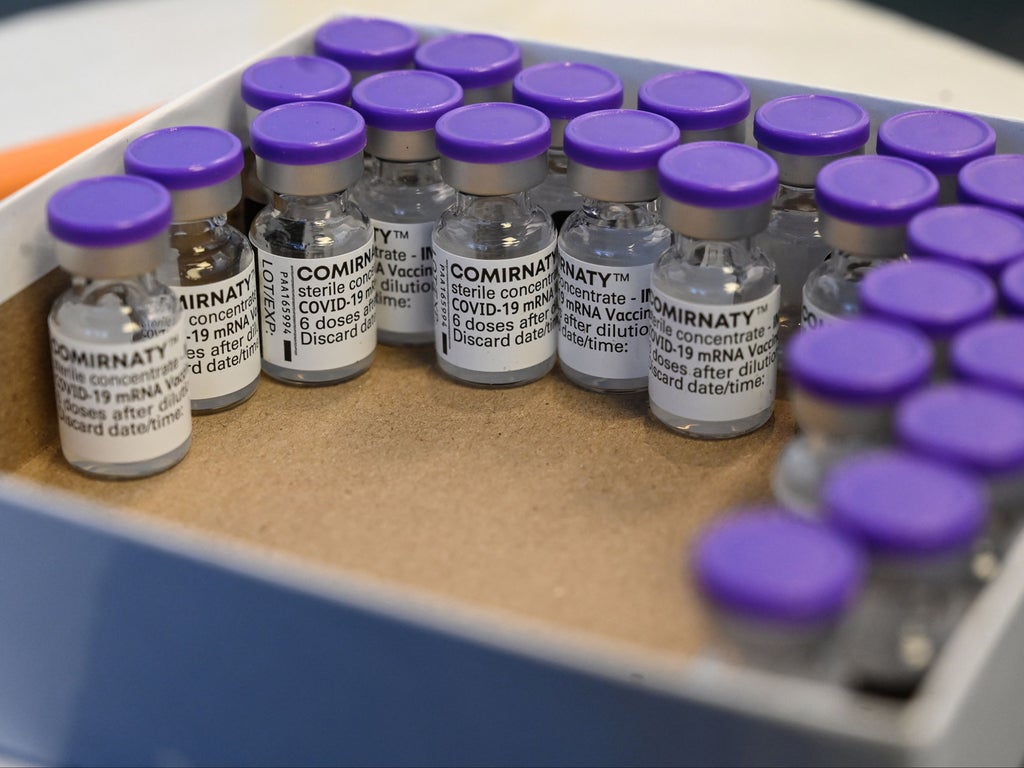
Pfizer is expected to announce a record £26bn in sales revenue from its Covid-19 vaccine during 2021 – enough to fill the funding shortfall in the world’s dose-sharing programme seven times over.
The bumper income, which is expected to be revealed at its annual earnings call on Tuesday, come as the Covax initiative is almost out of money.
At Pfizer’s last quarterly update, it revised its projected revenue from the vaccine to £26bn – up from £24.8bn – making its Covid-19 jab one of the most lucrative drugs in history.
Global Justice Now, a health campaign group, said Pfizer had “made more than enough money from this crisis” and urged the company to start sharing its vaccine blueprints with other manufacturers to improve access to doses among poorer countries.
“Right now, there are billions of people who cannot access Covid-19 jabs,” the group said. “Many are in countries with the facilities needed to manufacture mRNA vaccines, but Pfizer’s zealous guarding of its patent stands in the way.
“Meanwhile Covax – the only remaining route to vaccination for many countries – is broke.”
The programme, backed by the World Health Organisation and Gavi, has said it needs a fresh cash injection of £3.8bn – a seventh of Pfizer’s vaccine revenues – to support its global rollout this year.
Seth Berkley, chief executive of Gavi, told the Financial Times that Covax could not accept more dose donations because it has almost run out of the funds needed to buy ancillary items such as syringes. When asked how much the initiative has left, he replied: “None.”
Having previously criticised the lack of visibility over supplies for poorer countries, Mr Berkley acknowledged that there had been improvements, but added that funding was needed to sustain these efforts and ensure better access to doses.
Global Justice Now said manufacturers like Pfizer were fuelling this inequality through the refusal to share their vaccine blueprints with drug makers, preventing a ramp-up in the worldwide production of doses.
It also accused the company of “ripping off” public health systems with “eye-watering” mark-ups on its Covid vaccine pricing.
In the UK, the NHS has paid £3.76bn to Pfizer for 189 million doses of Covid-19 vaccines, including recently purchased booster shots, according to estimates from the group.
A non-profit dose of the vaccine costs up to £4.98, figures from the African Union indicate, though it’s been suggested the production cost could be as little as 76p.
However, Pfizer has reportedly charged the NHS £18 a dose for the first 100 million purchased and £22 a dose for the next 89 million, totalling £3.76bn.
At £4.98 per dose, the 189 million doses sold to the NHS will have cost Pfizer £941.2m to produce, meaning the company has charged the NHS a £2.8bn mark-up.
“The development of mRNA vaccines should have revolutionised the global Covid response,” said Global Justice Now. “But we’ve let Pfizer withhold this essential medical innovation from much of the world, all while ripping off public health systems with an eye-watering mark-up.”
The European Union has also faced similar hikes in vaccine pricing from Pfizer. Having previously been charged 15.50 euros per dose, the EU is now being asked to pay 19.50 euros, according to contracts seen by the Financial Times in August 2021.
The analysis from Global Justice Now comes after The Independent learned that around 2 million Pfizer doses are close to reaching their expiry date in the UK and are set to be thrown away.
Dose wastage has become worse in recent weeks after trusts ordered tens of millions of extra jabs in preparation for the UK’s booster drive, only for demand to drop off after Christmas, an NHS source said.
This is despite claims from ministers that “the UK does not stockpile Covid-19 vaccines”.
Last month, Foreign Office minister Vicky Ford told MPs “we manage our supply chain very carefully, ensuring that vaccine doses are used and have an impact as quickly as possible, either in the UK or beyond”.
Pfizer said it was “firmly committed to equitable and affordable access” to its vaccine.
“High and middle-income countries pay more than low-income countries, but at a value that is significantly discounted from our normal benchmarks, during the pandemic,” a spokesperson added. “Low- and lower-middle-income countries pay a not-for-profit price.”
The company said it was unable to comment on its vaccine pricing for the UK and other governments.







